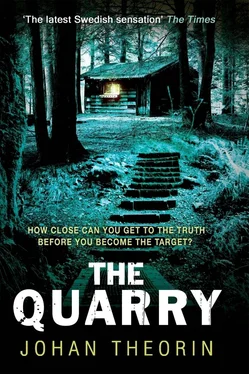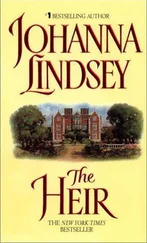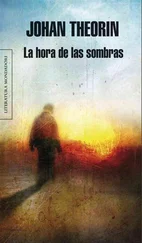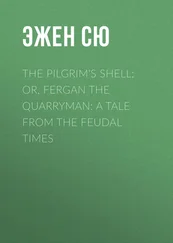Vendela doesn’t understand what he means.
After almost an hour the fire brigade turns up with two vehicles from Borgholm, but all they can do is prevent the fire from spreading. It is impossible to save the barn.
Several hours after midnight, when the fire-fighters have left but the yard is still thick with smoke, Henry is sitting out on the steps in the cold. He has carried the Invalid back to his room, but refuses to go inside. Vendela goes out to him one last time.
‘Who’s Jan-Erik, Dad?’
‘Jan-Erik?’ says Henry; he seems to consider the question before answering. ‘Well, he’s my son, of course... your brother.’
‘My brother?’
He looks over his shoulder at her. ‘Didn’t I tell you?’
Vendela stares at him. She has hundreds of questions, but asks only one. ‘Why doesn’t he have to go to school?’
‘He’s not allowed,’ says Henry. ‘They said it would be a waste of effort. It’s impossible to educate him.’
Then he reverts to staring into the darkness.
Vendela goes back inside and takes herself off to bed. She lies there as stiff as a board.
Perhaps Henry is up all night, because when he wakes his daughter at seven o’clock the next morning, he is still wearing the same clothes.
‘School,’ is all he says. Then he adds, ‘I let you have a lie-in today... No need to do the milking any more.’
Only when Vendela hears his words does she become aware of the smell of smoke in the room, and then she remembers the fire during the night. Then she remembers the Invalid. Jan-Erik.
Henry stops in the doorway as he leaves the room. ‘Don’t you worry about what’s going to happen. I’ve got the insurance policy and a receipt for the premium, so everything will be all right.’
Then Vendela remembers one last thing: the school trip is today. The class is going to Borgholm on the train.
She can go with them. She’s got the money for the fare, after all, and the cows are no longer a problem.
An hour later she is walking across the empty alvar, but gives the elf stone a wide berth, keeping her eyes fixed firmly ahead. She doesn’t want to see it any more, but the questions come anyway.
What did she actually wish for as she stood by the stone the previous day? She can barely grasp what she has done, and she doesn’t want to think about what the elves have done for her.
The children gather, ready to set off for the railway station, all smiles and eager chatter. Vendela does not smile, and she speaks to no one. She can still smell the smoke in her nostrils.
She goes to Borgholm on the train with her class and sits in a carriage with Dagmar and the other girls, but she still feels as if she is back on the alvar. Utterly alone. And she recalls nothing of the visit to Borgholm; in the shadow of everything that happened during the night, the day simply slips away.
When she gets home after the school trip, three hours after the cows would have needed milking, the yard is full of people.
The police are there — two constables from Marnäs are walking around inspecting the site of the fire. The gable at one end of the house has been blackened by the fire, and the barn is gone. All that’s left are the stone foundations. They look like a rectangular swimming pool full of ash, with charred planks of wood and roofing tiles sticking up out of the grey mess. There are three bodies lying beneath the covering of ash, their legs rigid, and the stench of burnt meat hangs over the whole yard.
Rosa, Rosa and Rosa. But Vendela doesn’t want to think about their names at the moment.
The neighbours have also gathered. People from Stenvik and even further afield have come to look at the remains of Henry the widower’s barn, and some of them have actually brought milk and sandwiches for the unfortunate family. Henry smiles and says thank you through gritted teeth, and Vendela bobs a curtsy, her cheeks burning. Then she creeps away. She goes into the empty kitchen and up the stairs, but when she tentatively tries the door of the Invalid’s room, it is locked.
‘Jan-Erik? It’s Vendela.’
No reply, not even laughter. All is silent behind the door.
She goes back downstairs and looks out of the kitchen window.
One of the men who has come from Stenvik is tall and slim, and he is looking around with a thoughtful expression. He speaks sympathetically to her father, then stands by the barn when the police suddenly call Henry over.
Vendela watches through the window as her father shows them around the ruins and points out the dead cows.
The police carry on looking. Henry comes inside to Vendela, who is still gazing out of the window. She sees the tall man from Stenvik come over and speak to the police after a while, pointing towards the barn, then at something down on the ground.
The policemen listen and nod.
‘I don’t know what they’re doing out there,’ Henry mutters. ‘They’re cooking something up between them.’ He looks at Vendela. ‘You’ll have to support me,’ he says. ‘If they start asking questions.’
‘Questions?’
‘If there’s a problem. You’ll do that, won’t you? You’ll support your father?’
Vendela nods.
In the twilight half an hour later the policemen make their way up the steps, bringing the smell of smoke into the kitchen with them. They flop down at the table and look at Henry.
‘Tell us what you know, Fors,’ says one of them.
‘I don’t know much.’
‘How did it start?’
Henry places his hands on the kitchen table. ‘I don’t know, it just started. I’m always unlucky, always. There’s something cursed about this place.’
‘So the fire woke you up?’
One of the policemen is doing the talking, the other is just sitting in silence, staring at Henry.
He nods. ‘At about midnight. And my daughter too.’
Vendela dare not even look at the police officers, her heart is pounding so hard it feels as if it’s trying to burst out of her chest. This is the twilight hour, and the elves will be dancing in circles in the meadows.
‘We think it started in two places,’ says the talkative policeman.
‘Oh yes?’
‘Yes. In the east and west gable end. And that’s rather peculiar, actually, because it has rained quite a bit. The ground is damp, after all.’
‘Somebody lit candles there,’ says the other one. ‘We found lumps of wax in the mud.’
‘Oh yes?’ says Henry.
‘And you could smell paraffin as well,’ says the first policeman.
‘That’s right,’ says the other one. ‘I could.’
‘Could we have a look at your shoes, Fors?’
‘My shoes? What shoes?’
‘All of them,’ says the policeman. ‘All the shoes and boots you own.’
Henry hesitates, but the officers escort him into the porch and go through all his shoes. They pick them up one by one, and Vendela can see them studying the soles.
‘It could be this one,’ says the first policeman, holding up a boot. ‘What do you think?’
The other one nods. ‘Yes, it’s the same pattern.’
His colleague places the boot on the kitchen table and looks at Henry. ‘Do you have any fuel in the house, Fors?’
‘Fuel?’
‘Paraffin, for example?’
‘Well, I suppose it’s possible...’
‘A can?’
Vendela listens to her father and thinks about the fire wriggling along like a snake, as if it were seeking out a path across the ground and up the wall of the barn, as if it knew where it was going.
‘A bottle,’ Henry says quietly. ‘There’s probably a half-full bottle of paraffin around somewhere.’
The policemen nod.
‘I think that’s it,’ says the first one to his colleague.
‘Yes.’
There is a brief silence, but then Henry straightens his back, takes a deep breath and says just one word: ‘No.’
Читать дальше












